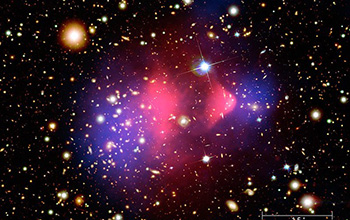Scientists propose repurposing tabletop sensors to search for dark matter

Scientists propose repurposing tabletop sensors to search for dark matter.
Scientists are certain that dark matter exists. Yet, after more than 50 years of searching, they still have no direct evidence of this mysterious substance.
The University of Delaware's Swati Singh is among a small group of researchers across the dark matter community that have begun to wonder if they are looking for the right type of dark matter. "What if dark matter is much lighter than what traditional particle physics experiments are looking for?" asked Singh.
Now, Singh, Jack Manley and collaborators at the University of Arizona and Haverford College have proposed a new way to look for the particles that might make up dark matter by repurposing existing tabletop sensor technology. The U.S. National Science Foundation-funded team recently reported their approach in a paper published in Physical Review Letters.
Singh explained that if you add up all the things that emit light, such as stars, planets and interstellar gas, it only accounts for about 15% of the matter in the universe. The other 85% is known as dark matter and doesn't emit light, but researchers know it exists by its gravitational effects. They also know it isn't ordinary matter such as gas, dust, stars, planets or humans.
Singh, who is also known for pioneering efforts in mechanical dark matter detection, added, "It could be made up of black holes, or it could be made up of something trillions of times smaller than an electron, known as ultralight dark matter."
Now, the researchers have proposed an experiment using a membrane made of silicon nitride and a fixed beryllium mirror to bounce light between the two surfaces. If the distance between the two materials changes, the researchers would know from the reflected light that dark photons are present because the silicon nitride and beryllium have different material properties.






